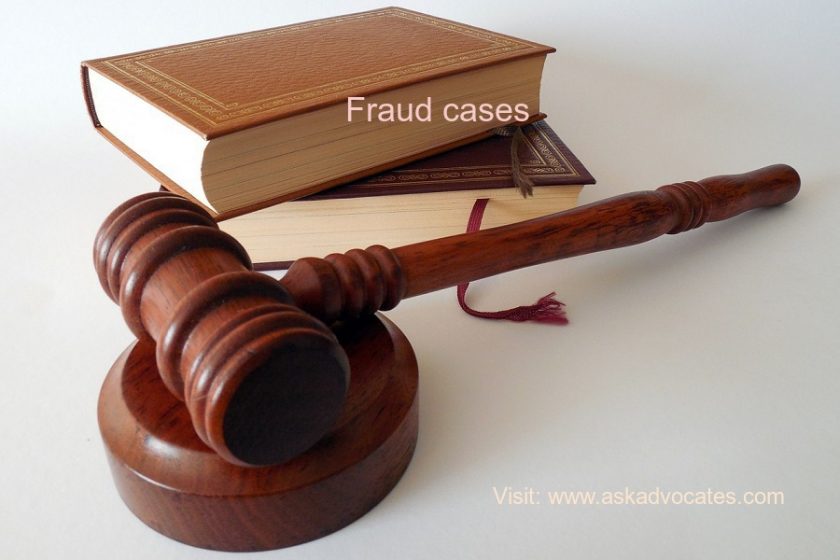ADVOCATES FOR FRAUD CASES IN CHENNAI
Advocate Saravvanan Rajendran Law associates advocates represent individuals & business organizations across a wide array of fraud cases. Anybody can call and ask advocates in our law firm about fraud case laws and remedies. Some examples of fraud cases are like mortgage fraud, conspiracy to defraud and so on.

Senior criminal advocates offer advice for suspects and defendants on all investigation and prosecution matters. For example lawyers offer advice on raids, search and seizure. Moreover, we offer our opinion on arrest, plea & trial. Attorneys in this law firm offer strategic advice all through the process. Meanwhile, they strive to achieve outstanding results for all our clients.
Examples of fraud Cases
Businesses can be victims in some cases for the fraud committed by co-owner. Businesses can kneel- down due to fraud by employees or suppliers too. Other fraud Cases instances are real estate agent misrepresenting a property condition. Then, a business doctoring its profit statement to attract buyers etc.
search the best Criminal advocate to handle fraud cases of all types of businesses. It can be a car dealership, / insurance cos. / physician clinic etc. Attorneys in Advocate Saravvanan Rajendran Law associates have experience in handling consumer fraud Cases. The aim of these advocates is to protect the clients’ interest and get compensation.
What is Fraud?
There is no definition of Fraud in the Indian Penal Code (IPC). But we have been using the term fraud in our day to day lives.
Fraud is a deliberate act of deception. The act gets done with the intent of taking unfair advantage of another. The deception is to gain another person’s loss. Two things get assumed in fraud cases. First, it is deceit and second injury due to deceit.
Where can you draw up the Implications of fraud in Indian Penal Code?
As stated before, there is no definition of fraud in the Indian Penal Code. The following section of IPC infer about fraud
- SEC. 421 – Dishonest/fraudulent removal or concealment of property to put-off distribution to creditors
- SEC-422 – Dishonest/Fraudulent prevention of debt available for creditors.
- SEC-423 – Dishonest /Fraudulent deed execution of transfer that contains a false statement of consideration.
- SEC-424 – Dishonest/Fraudulent removal or concealment of property.
Let us consider fraud under various perspectives
SEC. 421 – Dishonest/fraudulent removal or concealment of property to put-off distribution to creditors
Section 421 of IPC refers to fraud in the context of insolvency. Here the insolvent disposes of a property with dishonest intent. He aims to cause wrongful loss to the creditor. This offence comes under fraud.
Even Benami transactions come under fraud. A businessman who keeps goods in his shop bought on credit but does not repay the creditor is a case of fraud.
Punishment under Sec.421 is – Imprisonment up to 2 years plus a fine. It is a bailable offence. The act is non-cognizable and trial-able by a Magistrate. It is a compoundable offence by a creditor by the court’s permission.
SEC-422 – Dishonest/Fraudulent prevention of debt available for creditors.
A person who is dishonest and fraudulent in an act or omission. This leads to a situation where no amount is available as per law to repay his debts or another person’s debts. It is an act of preventing creditors defraud by concealing a property. A person has the means to return a debt. But he is not availing such means to repay the debt to creditor comes under this offence.
Punishment of Sec. 422 is – Imprisonment of whichever description up to 2 years with/without fine.
SEC-423 – Dishonest /Fraudulent deed execution of transfer which contains a false statement of consideration.
Under this type of fraud, there is –
– false presentation of consideration &
– false presentation of a beneficiary name.
A person who is dishonest or fraudulent in execution, signing or became a party to any deed. The said deed infers to transfer charge upon the property involved. The deed must contain a false statement about the person to whom it is beneficial.
Punishment for Sec.423 is – Imprisonment of either description up to 2 years or with fine or both. It is a bailable offence.
SEC-424 – Dishonest/Fraudulent removal or concealment of property.
Any person who by fraudulent or dishonest means has removed/concealed any asset. The asset may be belonging to him or another person is punishable under Sec.424.
A person who has given help for the act also comes under this offence. A person who has given up his entitled claim with dishonesty or fraud comes under this offence. The crucial point here is to find out about property removal was dishonest or fraudulent.

Punishment for Sec. 424 under IPC is Imprisonment up to a term of 2 years of either description. Plus you also have to pay fine. Else you will get punished with imprisonment and fine. It is a bailable offence.
Ask advocates for the best legal remedy for fraud cases
All good criminal advocates are persistent in defending the cases of all our clients. If need may arise, Attorneys report misconduct and seek immunity from prosecution. In fact, expert criminal advocates in our law office represent your plea bargaining before concerned authorities. Just ask advocates here, they explain you the impact of prosecution immunity and plea bargaining.
Corporate advocates in Chennai at this law firm also assist companies who suffered fraud. The fraud may be from employee or third party. Retainer lawyers mostly assist you in investigations, gathering proofs and liaison with authorities.
Of course, a retainer advocate will help you in determining action to prevent future fraud cases. Fraud causes much damage to your business. Fraud causes business loss and affects your business credibility. Find good advocates who help businesses and stop fraud. Most of all, They assist you in putting your business back on track.
Contact Advocates for fraud cases in Chennai

Call the senior criminal legal advisers in this law firm for fastest remedy.



